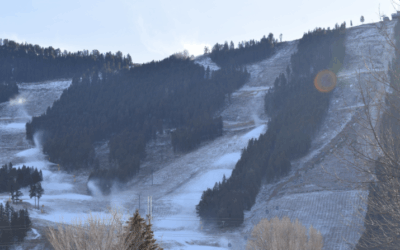Make our newscast part of your daily listening routine. Subscribe on Spotify (or wherever you listen to podcasts).
Normally Wyoming Pathways would be prepping for summer projects right now.
“We would love to be hiring trail builders right now to do these projects that we were contracted for,” said executive director Michael Kusiek. “But right now, we don’t have high certainty that those projects are going to happen.”
That’s because about 90% of Wyoming Pathways projects are federally funded, Kusiek said. He added that recent federal cuts and freezes are putting a question mark on how the group can continue to function.
“For the first time in our organization’s history, we’re sort of saying, ‘Huh, could this be it? How do we pivot?’ You know, if we have to,” Kusiek said.
That pivot could mean more of an advocacy role, rather than on the ground work. Until now, that work was the group’s bread and butter.
Federal funds trickle down to the nonprofit in a couple of ways. Sometimes, it’s through a “cost share agreement” with the U.S. Forest Service (USFS) or the Bureau of Land Management (BLM). The federal agencies spend part of their budget on a project and Wyoming Pathways’ share is “our labor and our time and our planning,” Kusiek said.
Other times, the group will apply for grant money, like from the Wyoming Office of Outdoor Recreation. In the last couple of years, the state office divvied out millions to different groups and projects across the state, and much of it was funded through the federal American Rescue Plan Act (ARPA).
In fact, this grant money helped with Wyoming Pathways’ biggest accomplishment from last summer, the Pole Mountain Connector trail in Laramie. It connects the city to another trail system about 13 miles east of town.

“This trail has been wanted for decades, and the only way for people to get there on foot or on bike has either been on the highway or going through private land, essentially illegally,” Grace Templeton said, community engagement for Wyoming Pathways.
The group had seven new projects lined up for this summer. It was shaping up to be their biggest year yet. Kusiek said four of those projects “feel likely” at this point based on what he’s hearing about funding and staffing at federal partner agencies. But, it’s still a gamble with uncertainty.
That’s because Pres. Trump signed an executive order that froze most federal grants across the nation. Many are under review and their future is in question, while other grants have officially been axed, as reported by WyoFile.
That kind of news and feelings of uncertainty leaves Kusiek worried. Even though Wyoming Pathways was allocated federal monies, it was prior to the executive order. And typically the feds reimburse the group after a project.
“We need those funds to make sure we’re just not spending our money, that we’re actually getting reimbursed for spending our money,” he said.
Kusiek pointed to the Tie Hack trail project near Saratoga’s French Creek. It flooded out 14 years ago destroying parts of the trail and several bridges on it. Kusiek said they contracted with a group in Texas to build new bridges.
“We ordered the bridges when this thing [project] was full steam ahead like they’re built and we’re shipping them to Saratoga,” Kusiek said. “And so if I don’t pay the bridge company, then they get stuck with bridges that are built for this project, and then if we don’t get reimbursed [with federal monies], then we’re stuck.”
Kusiek said all this could mean fewer new recreation trails and less maintenance of old ones.

“But people are going to go into the woods anyway,” he said. “All these visitors who are coming to Wyoming aren’t going to say, ‘Oh, they don’t have any trail maintenance. Let’s not go.’”
That could mean creating their own trails to get around things like fallen trees or collapsed bridges, said Kusiek. According to the National Park Service, this can damage sensitive animal and plant habitats, as well as be dangerous to the user, like putting them near cliff edges or getting them lost.
Kusiek said he’s in talks with Wyoming’s congressional members to try to get answers on the funding future. But, there’s no clear answer yet for Wyoming Pathways or many others. In fact, the Southern Environmental Law Center (SELC) and Public Rights Project are suing the Trump administration because of this uncertainty.
“There are currently more questions than answers for grant recipients,” according to an SELC press release. “Because of the lack of transparency and communication from federal agencies, it remains unclear which of an ongoing series of agency actions are responsible for the freeze at any given time.”
Much like Wyoming Pathways, the plaintiffs say the uncertainty is causing nonprofits and cities across the country to not be able to confidently move forward with federally funded projects. They specifically say this impacts economic growth and climate change adaptation.






